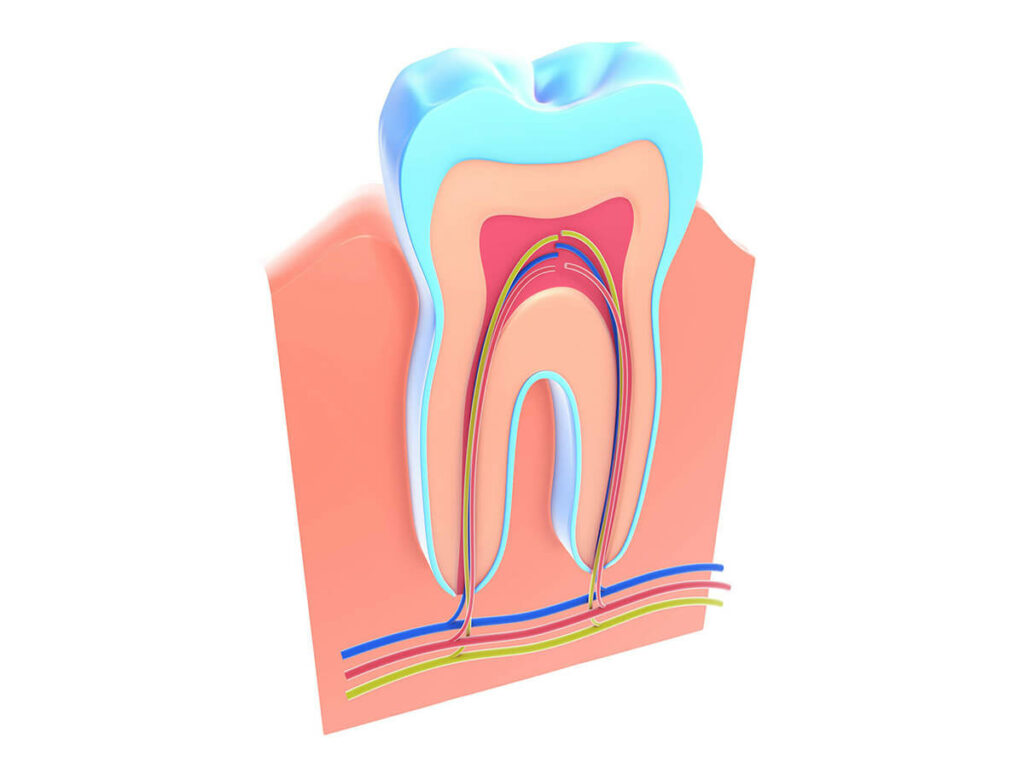Root Canal Treatment
Root canal treatment is a proven procedure to save an infected tooth from extraction. It restores the tooth's natural appearance and leaves your mouth healthy and strong.
Root Canal Treatment at Dental Reflections Dublin
Deep within each tooth is a vital component known as the pulp—a soft, delicate material crucial for tooth function and vitality. The enamel shields this inner structure from harm. However, when harmful bacteria breach this protective barrier, the pulp becomes susceptible to infection, leading to potentially severe consequences.
Infections within the tooth’s pulp can come from deep cavities or sudden traumas, posing a significant risk to dental health if left untreated. Without intervention, the affected tooth may ultimately be lost. Root canal treatment emerges as a highly effective solution to address such serious inner tooth infections, preserving dental health and preventing tooth loss.
Recognizing Signs of an Infected Root Canal
Early detection of an infected root canal is crucial in mitigating further complications. Here are some common symptoms to watch for:
- Persistent Toothaches: Intense and relentless tooth pain that persists over time.
- Sensitivity: Increased sensitivity to hot and cold foods and beverages, often causing discomfort.
- Swelling and Tenderness: Swollen and tender lymph nodes in the affected area, indicating an underlying issue.
- Abscess Formation: Recurring abscesses on the gums, signaling a potential infection within the tooth’s pulp.
If you experience any of these symptoms—schedule a consultation to address any concerns and protect your smile’s longevity.
Schedule an Appointment Online
-
How is a root canal procedure performed?
Root canal procedures start with digital X-rays to determine the extent of the damage. Then, generally, sedation is provided for comfort as the dentist accesses the tooth’s inner structure from the top. They carefully clean out an infectious material to leave the tooth as a hollowed-out structure. Then, an antimicrobial liquid flushes the root canals down to the jawbone. The tooth is then treated with a medicated filling substance to offer support and strength and to help the tooth heal in a timely manner. To protect the tooth, a dental crown is placed over the structure to prevent fractures and breakages. Read more about the process here.
-
How long does a root canal take?
The average time a root canal procedure takes is 30 – 60 minutes. If the procedure is being performed at a large tooth or multiple teeth, it could take up to an hour and a half. Depending on your situation, we may need to have you come in for an additional appointment to complete the root canal therapy.
-
How long does the pain from a root canal last?
It is a common misconception that root canals are very painful. However, the truth is that a root canal procedure is typically no more painful than a regular dental filling. Dentists usually administer an anesthetic before the procedure to make the patient as comfortable as possible. After the procedure, there may be some tenderness or sensitivity for a few days as the root canal heals, and the tissues around the gums may be swollen or agitated.
-
What is pulpotomy?
If you experience sensitivity or constant pain, or if the tissue around a tooth is swollen and painful, you may have pulp damage. Damage to the interior living part of the tooth can occur because of trauma, decay or other infection. The ‘pulp’ refers to the live part of the tooth.
If the pulp is damaged, it is important to retain as much of the living pulp as possible, while also treating the infection or removing any damaged sections. One way we do this is with a pulpotomy.
A pulpotomy can be performed if the pulp root is unaffected, and just the tip of the pulp is damaged. If the root is healthy we will remove all the decay and then place material over the remaining pulp to protect it. Finally we will place a crown.
A pulpectomy, more commonly known as a root canal is performed if the damage has extended into the tooth root, we will need to remove all of the pulp extending into the root.
-
What are alternatives to root canal treatment?
Most people facing root canal treatment are curious as to whether there are alternative procedures worth considering. Since endodontic therapy is considered a “last line of defense” for restoring your tooth, the only remaining options are to have your tooth extracted or wait until you’re in pain and have it removed at a later date. Unfortunately, with either of these options, you risk the infection spreading deeper into your face or adjacent teeth. Getting a root canal is the best possible solution.
If you opt to have your tooth extracted, there’s still the concern of replacing it as soon as possible. Otherwise, the extra space in your bite can throw off the alignment of your surrounding teeth. Two of the more common replacement options include a dental bridge or implant.
Questions About Root Canal Treatment?
If you have any questions about root canal treatment or for a consultation—contact us or schedule your appointment using the link below, or explore the numerous other dental services we offer.

